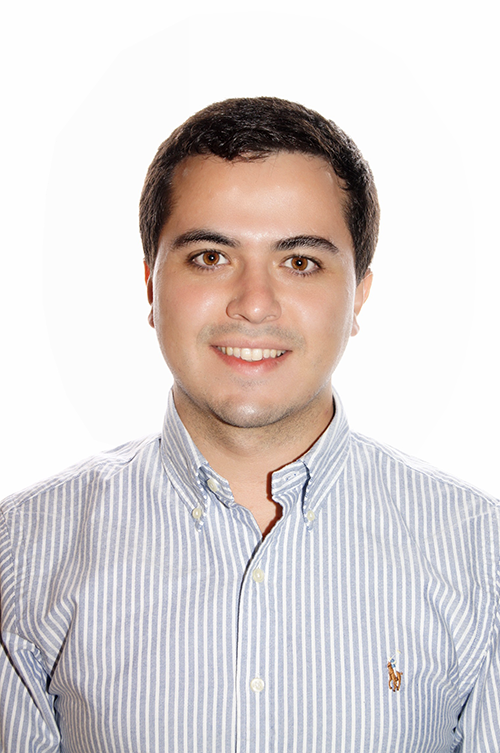Carlos is now part of an Early Career Program at Ericsson
Carlos Figueira graduated from the master’s programme in Industrial Management in 2016. He now works at Ericsson in Madrid.

Hi Carlos, what are you doing at the moment?
I'm working at Ericsson and I am now part of its Excellerate Early Career Program. This development programme is for professionals who already have some work experience and runs for 18 months. During this time, participants from all over the world go through three rotations in the most exciting areas of the company, including a six months on-site international job assignment to gain real insights into the business.
What is a regular day like at your job?
There are no regular days in business these days! Things change very dynamically and quite often – so we are always readjusting our work. However, one main aspect of any day at work is that they are packed with meetings, not only face-to-face at our headquarters but also with people from all over the world. Up to now, I've been involved in projects with people from the United States, Spain, India, Philippines, UAE, Germany and Sweden. It has been great to interact with so many people from such diverse backgrounds. But overall, a regular day at work always brings new challenges that we need to solve as one team. Ultimately, it is about the paradigm shift that 5G networks are about to bring to our industry, customers and partners.
Have you worked on anything else since you graduated?
Through my two-year journey at Ericsson I've been involved in several types of projects, from sales operations, to marketing to finance. Generally, most assignments have been international and have demanded great flexibility and execution speed on my part.
I am currently also part of the Excellerate Early Career Program at Ericsson, which basically takes you through a series of executive education programmes and on-site international assignments in any of our offices in more than 150 countries worldwide. The programme runs parallel to my regular assignments in my home unit, so it demands a lot of hard work but is also about having fun, dealing with challenges, as well offering development opportunities.

Why did you choose this programme at KTH?
Initially I was attracted to KTH because of the quality of the education I was going to receive. In whatever you do in life, you have to aim to achieve the highest possible standards – and KTH ticked that box. Then I wanted to get out of my box, which comprised five years of technical education in Mechanical Engineering. I knew that the skills I possessed would be more powerful if I had a broader understanding of the problems that needed solving in the world. Before my master’s, I was a solution looking for problems. After my master’s, I had problems to solve with the solutions I had gained from my technical background.
Are there any insights or knowledge you acquired during your studies that have been particularly useful for you in your career?
The most valuable learning was from the courses in finance and entrepreneurship, basically because they were the missing key in my technical education that would enable me to have a full understanding of the root of the problems we solve every day at work.
What was the best aspect of your studies at KTH?
KTH’s cooperation with the Stockholm School of Entrepreneurship was the best part. I took as many electives as I could at that school and this gave me a real-life vision of how the corporate world is managed – on many levels. It also inspired me to start my own startup, Toteler. At the time we managed to build a team of eight people and deliver a functional product that we ran for several months. This project was even accepted and hosted for a year by KTH Innovation. Unfortunately, we didn't manage to reach the level we needed to grow and scale, but the knowledge we gained will last a lifetime!

What is your best memory from your time at the university?
The best memories are from KTH Innovation and Toteler (the startup I founded in the middle of the programme). They gave me the opportunity to put into practice most of the knowledge I gained from the courses at the Stockholm School of Entrepreneurship. It was a very intense period. However, during this journey we were even taken for one week to Silicon Valley to pitch our startup to world-renowned angel investors and were prepared by the same coaches that train TED speakers. Nothing was more demanding than that, but I've never learned so much in such a short time.
What are your plans for the future?
I plan to continue working in the large-scale corporate world with Ericsson. The on-the-job knowledge that I gained from the startup during my days at KTH is very useful in a company like Ericsson, which is eager to learn and do more things – like a startup. When you do this on the scale of such a large company, the impact of your day-to-day world is huge. Moreover, now that I am part of the Excellerate programme in Ericsson, I will be able to leverage a network.

What would you want to say to a student who was thinking of applying for this programme?
What you can really learn is up to you. No professor will make it mandatory for you to apply your knowledge to start solving problems in our societies. But if you are really eager to make an impact, you can trust KTH and the programme to have all the support structures you will need. And the best part of the programme is that it will shift your approach from problem-solving, to problem-finding and solving – and it is exactly at this point when you will see millions of opportunities ahead.
